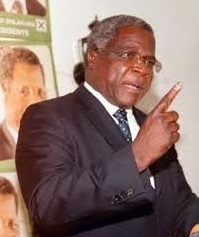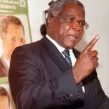
Mozambique’s RENAMO Conducts Low-Level Insurgency While Running for Election
Publication: Terrorism Monitor Volume: 12 Issue: 13
By:

Mozambique has been slowly descending into a political-military crisis since April 2013, as the ruling Frente de Libertação de Moçambique (FRELIMO – Mozambique Liberation Front) party has unsuccessfully attempted to persuade the Resistência Nacional Moçambicana (RENAMO – Mozambican National Resistance) to end its low-level insurgency in the countryside. Dozens have been killed in attacks largely centered on Mozambique’s highway network.
In the two decades since Mozambique’s civil war ended, the economy has slowly blossomed, even though the country remains dependent upon foreign assistance for much of its annual budget and a large majority of the population remains below the poverty line. In 2013, Mozambique’s economy remained one of the most dynamic on the continent, with a 7 percent gross domestic product rate increase, despite the politico-military, low-intensity confrontations between government and the opposition movement. Foreign direct investment has focused mostly on country’s extractive sector, with constantly rising oil, coal and aluminum exports.
Mozambique’s general elections, scheduled for October 15, have become a three-way contest between FRELIMO candidate Filipe Jacinto Nyusi, RENAMO’s Afonso Marceta Macacho Dhlakama and Daviz Mbepo Simango, who established the Movimento Democrático de Moçambique (MDM – Mozambique Democratic Movement) in March 2009. FRELIMO’s Nyusi, who is heavily favored to win, has served as Mozambique’s minister of defense since 2008.
Two RENAMO actions complicate the electoral procedure – the first is its demand that its armed units have parity in the Forças armadas de Moçambique (FADM – Mozambique Armed Forces) as a precondition for laying down its arms. The second problem is that Dhlakama is running for the presidency for the fifth time in two decades.
Despite standing for the country’s highest elective office, Dhlakama, an unsuccessful candidate in 1994, 1999, 2004 and 2009, has not yet reined in RENAMO attacks, which consist largely of ambushes along one of the country’s main highways, the Estrada Nacional (EN1), which runs the length of the country, linking Mozambique’s capital Maputo in the south with the northern reaches of the nation.
After achieving independence from Portugal in 1975, roughly one million people died in the subsequent civil war between FRELIMO and the newly-formed, anti-Marxist RENAMO movement. The bitter conflict lasted until October 4, 1992, when the two parties signed the General Peace Accord (GPA) in Rome with current President Armando Emílio Guebuza as one of the negotiators. Protocol IV of the GPA stated that the Mozambique military “Shall be non-partisan, career [-oriented], professionally trained and competent; it shall be made up exclusively of Mozambican citizens who are volunteers and drawn from the forces of both Parties.” [1]
In every presidential election since a multi-party system was introduced in 1994, voters have returned FRELIMO to power. Negotiations between the parties are now deadlocked, since the Mozambican government does not accept RENAMO’s demand to introduce a system of parity in both FADM and the Forças de Defesa e Segurança (FDS – Defense and Security Forces). Speaking from the bush on May 23, Dhlakama said:
On June 2, RENAMO began five days of ambushes along the EN1, with ten people dying in the assaults according to a military source speaking on condition of anonymity (AllAfrica.com, June 9). On June 6, Dhlakama spoke by mobile phone from Gorongosa district to a Maputo meeting of religious leaders attempting to persuade him to halt RENAMO military operations (Diário de Notícias Globo [Lisbon], June 10). Dhlakama rebuffed them and instead threatened that, unless the government acceded to RENAMO’s demand for “parity” in the armed forces, RENAMO would divide the country (AllAfrica.com, June 7).
Despite Dhlakama’s candidacy, RENAMO guerrillas continue to battle government troops, most recently engaging in a skirmish with a FDS garrison in Muxungué in Chibabava district in Sofala province on June 17, which the militants claimed was in retaliation for an earlier FDS attack on their base in Mangomonhe (Verdade jornal [Maputo], June 19).
The previous day RENAMO guerrillas mounted two separate assaults on vehicles traversing the EN1. The first attack occurred on June 16, when a bus with 20 passengers traveling the EN1 section between the Save River and Muxungué in Chibabava district was raked by small arms fire, injuring five people. The second assault with on a convoy of more than 300 vehicles with a military escort bound southward to Muxungué. There were no casualties during the five-minute attack (AllAfrica.com, June 18).
The renewed RENAMO violence is a direct result of the presidential campaign; on May 2, a Dhlakama spokesman, Antonio Muchanga, claimed that the government was concentrating FADM forces in Gorongosa district in central Sofala province in order to “physically liquidate” Dhlakama, who is hiding there (The Zimbabwean, May 4). At the time Muchanga spoke, Dhlakama had not been seen in public since FADM forces overran and occupied the main RENAMO military base in Gorongosa on October 21, 2013. Following Muchanga’s press presentation, RENAMO abrogated their four-month unilateral ceasefire and resumed ambushing convoys, concentrating on the EN1 between the Save river and Muxungué.
FRELIMO presidential candidate Felipe Nyusi obliquely addressed the issue of ongoing violence on June 18 during a political rally in Nhacolo in Manica province, remarking: “A nation must be united if it is to be able to beat the challenges on the path to development,” adding that peace was where the seeds of patriotism germinate, and while there were “people who did not respect this point of view” (a clear reference to RENAMO), government efforts to end RENAMO’s armed resistance would continue (AllAfrica.com, June 18).
In the meantime, the attacks continue. In the most recent serious incident, RENAMO guerrillas again attacked vehicles travelling along EN1 on June 4 between the Save River and Muxungué, killing 15 soldiers and wounding 26 others. After the incident, the head of the government negotiating delegation, Jose Pacheco, admitted that, “in reality, there is no longer a ceasefire” (Agencia EFE [Madrid], June 4).
In the interim, positions are hardening on both sides. On June 9, the deputy head of the government’s delegation to the 61st round of talks between RENAMO and the government, Transport Minister Gabriel Muthisse, said in reference to RENAMO demands for parity in FADM and the FDS: “Imagine the government of Nigeria handing over the army to Boko Haram, and the Afghan government handing over the army to the Taliban. It is not possible” (Xinhua, June 9).
While Dhlakama is at best a long shot to win the October 15 election, RENAMO hopes to increase its visibility in Parliament, where it now has 51 of 250 seats. Discussions between RENAMO and the government have been deadlocked for more than a year. The major unresolved sticking point is the integration of RENAMO armed militants into the FADM and the FDS. Guebuza’s administration has been steadfast in rejecting RENAMO’s demand for parity in the FADM and the FDS. Nyusi, FRELIMO’s presidential candidate, has directed FADM operations for six years as minister of defense. If he intends to modify Guebuza’s policies towards integrating RENAMO into Mozambique’s armed forces, he has given no indication of it in his speeches around the country. Accordingly, the turmoil in Mozambique seems likely to continue.
Dr. John C. K. Daly is a Eurasian foreign affairs and defense policy expert for The Jamestown Foundation and a non-resident fellow at the Central Asia-Caucasus Institute in Washington, DC.
Note
1. United Nations Security Council S/23645, “General Peace Agreement for Mozambique, Rome, 4 October 1992,” https://peacemaker.un.org/sites/peacemaker.un.org/files/MZ_921004_MozambiqueGeneralPeaceAgreement.pdf.





